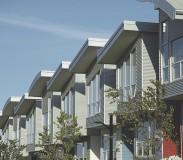
The Future of Renting Your Home

In the United States, the mortgage and housing industry was partly responsible for tipping the economy into the Great Recession. Since then, the terms “renting” and “downsizing” have taken on new meaning, with more and more people deciding against the risk of taking out a mortgage to purchase their own home. And while most Americans still do aspire to buy their own home at some point, that home is likely to be smaller than the mini-mansions owned by the previous generation.
Popularity
Renting has long been viewed as a transitory step for those who are either not ready to settle down where they are or are saving in order to be able to put a down payment on a first home. Immigrants, young working professionals, and university or college students were the most likely demographics to rent. However, many past homeowners who lost their homes in foreclosures are on that same list. A common refrain is why pay someone else’s when you can pay your own? But is it truly a waste of money to rent your living space as opposed to buying it? As demand increases for rental properties across the United States, this idea is coming under fire, with some financial experts arguing it’s just as acceptable to rent and invest as opposed to investing in a home.
Status Quo
A few years ago, it wasn’t families purchasing empty, foreclosed homes but equity companies, financial firms, hedge funds, and banks who were able to make bulk purchases, sometimes in cash. While the goal was to sell these homes when the housing market recovered, with the demand for rental properties increasing, many owners decided to simply convert homes into rental units that would continue to make them a profit for years to come. Unfortunately, this trend has driven up the price of housing, making houses less affordable for the average person.
Pros and Cons
 Even if home ownership is going the way of the dodo bird, it’s important to keep in mind that renting has its benefits. Large rental units designed for long-term renters, such as empty nesters, come with a wide array of perks. Rental complexes may include indoor swimming pools, gyms, party or meeting rooms, and depending on the size of the complex, they may even include restaurants, convenience stores, and rentable guest apartments. Twenty-four hour security in most large rental complexes is also a plus, as most people simply can’t afford to pay for the same measures in their private home. Renting takes the responsibility off you to fix things when they break. One of the major pitfalls of renting is that when space is truly at a premium, such as in large urban centers, adequate parking can be difficult to find and pricey, as well.
Even if home ownership is going the way of the dodo bird, it’s important to keep in mind that renting has its benefits. Large rental units designed for long-term renters, such as empty nesters, come with a wide array of perks. Rental complexes may include indoor swimming pools, gyms, party or meeting rooms, and depending on the size of the complex, they may even include restaurants, convenience stores, and rentable guest apartments. Twenty-four hour security in most large rental complexes is also a plus, as most people simply can’t afford to pay for the same measures in their private home. Renting takes the responsibility off you to fix things when they break. One of the major pitfalls of renting is that when space is truly at a premium, such as in large urban centers, adequate parking can be difficult to find and pricey, as well.
Quick Wrap-Up
Renting is the wave of the future. Although many Americans still desire to become home owners, the housing market has become increasingly competitive and pricey, making a lot of people question whether it’s worth it to pour their savings into buying a house. Renting is an option that may free up your income for other investments – not to mention, modern rental complexes come with an array of perks.








